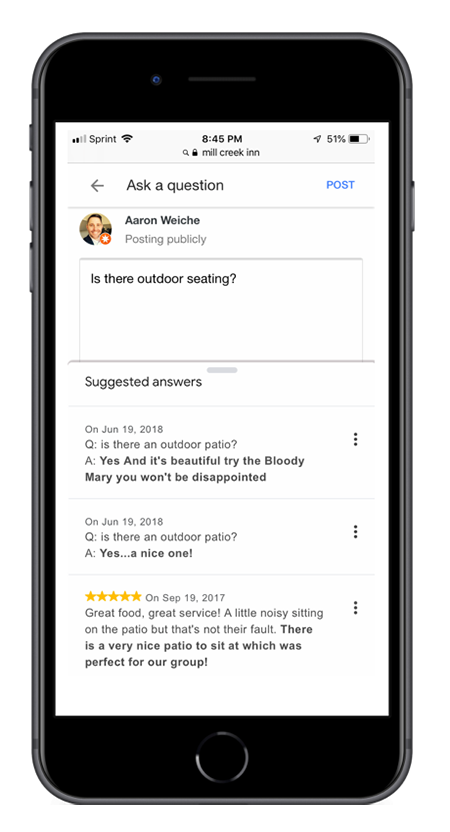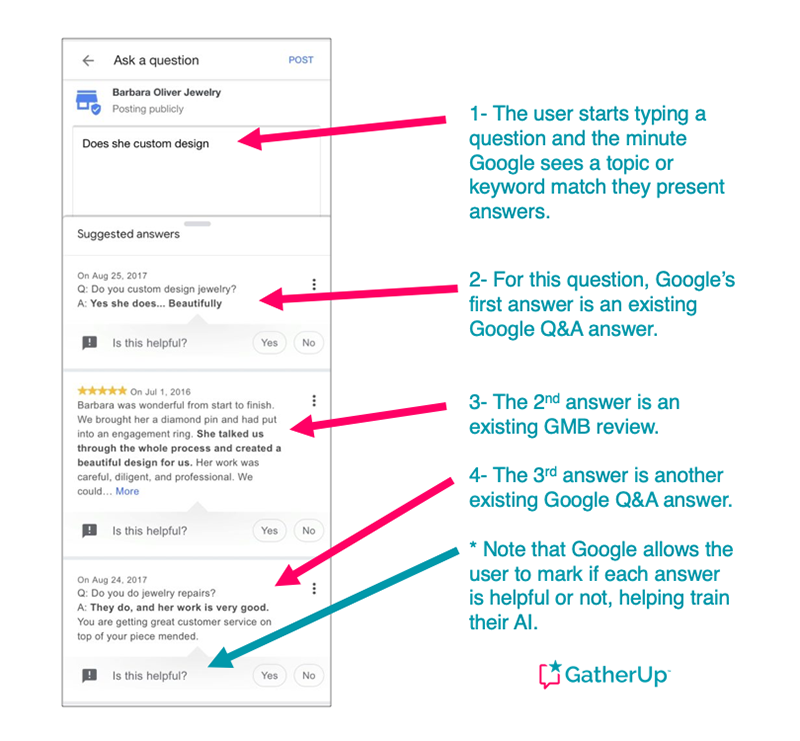Google appears to be rolling out an upgrade to Google Questions & Answers (Q & A) that uses previous answers to questions and Google Local Business (GMB) reviews to suggest answers to new questions in real time. (h/t to Colan Nielsen of Sterling Sky for spotting it)

The new feature, currently only visible on mobile browsers, attempts to instantly answer a new user question using phrased based sentiment analysis. As you complete the question in Google’s Q&A section, different answers pop into view that might be a match.
Using Reviews And Previous Answers To Answer In Real Time
It is not totally obvious how Google orders the suggestions but it appears at first glance that if there are answers to a previous similar question they show first if they have relevant content, followed by Google review content that might offer a similar answer.
If there are no answers in the existing questions, then Google attempts to suggest an answer to the new question just using review content.
Regardless of whether it uses an existing answer from Q & A or online review content, relevancy to the question seems paramount.
Clearly if you have a lot of reviews and no Q & A, Google will suggest an answer as well but if you just rely on review content some measure of control is lost as the answer might come from either a negative or a positive review.
Why Does This Matter To Your Business?
We have long recommended that businesses create their own Questions and Answers on their Business Profile (aka the Knowledge Panel). We have consistently suggested that Google Q & A was important and that you ask and answer real questions that consumers typically ask. This allows the consumer to make a decision to purchase from you directly from the Business Profile.

This new feature makes us think that mosts businesses should double down on that recommendation. Asking and answering more questions with an authoritative answer gives you some measure of control over the content that the consumer sees. And more importantly facilitates their purchase journey.
If you would like a fuller understanding Google’s Q & A feature, download our Google Q & A ebook.
Will consumers use the feature? And if so how many questions should a business ask and answer?
Via our reporting tool, we have seen consistent and steady use of Google Q & A since introduction . We think that as consumers learn about this new capability to suggest answers to a question while they write it, they will increase their utilization.
As to how many questions a business should craft and answer, there is no exact number. You should try to answer every common in-bound question that potential customers need answered before they decide to do business with you.
It could be three, it could be ten but the new feature speaks to asking and answering more questions rather than fewer if it eases the customer path to your door.
What does it say about Google and the future of local?
This new feature clearly demonstrates that Google parses all content in GMB reviews and in Q & A and is attempting to understand them, in a broad sense. They can now answer consumer questions about your business instantly with existing content.
Obviously that also suggests that Google will leverage that information to potentially deliver your business profile on long tail queries that they may not be able to answer otherwise.
As Google’s understanding of the review and Q & A content grows, by extension, their understanding of your business, is growing. The design of the new feature allows consumers to easily indicate whether the suggested answers Google provided were helpful, training the machine and furthering the accumulation of more nuanced and deeper content in the knowledge graph of your business.
If the feature becomes widely adopted it also suggests that the trend of consumers stopping at Google and not making it to your website will likely increase.
This feature shows just one more way Google is meeting the consumers needs right in search, likely taking traffic from your website. It’s probably ok if Google “steals” your traffic if, in the end, they deliver you the customer.
